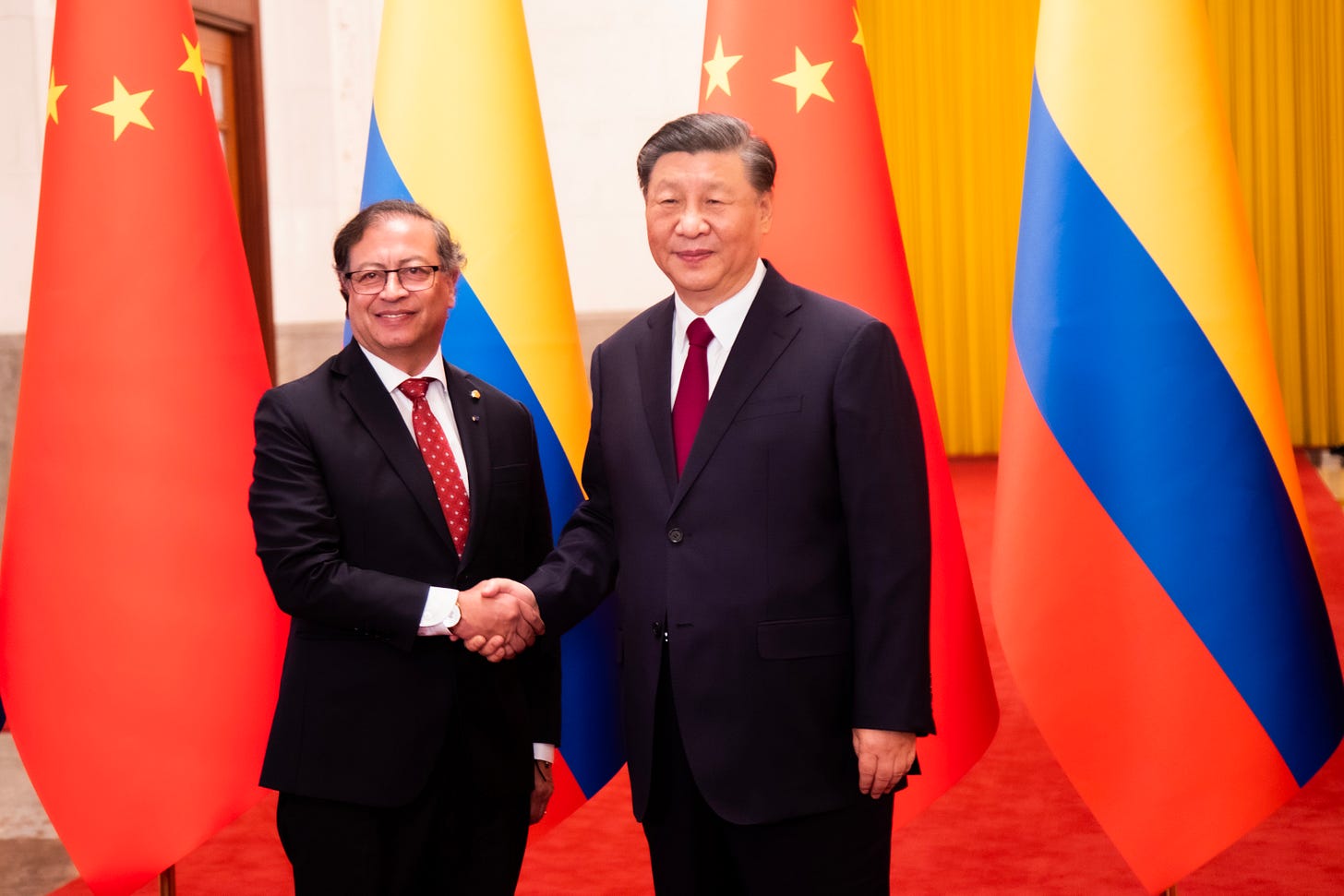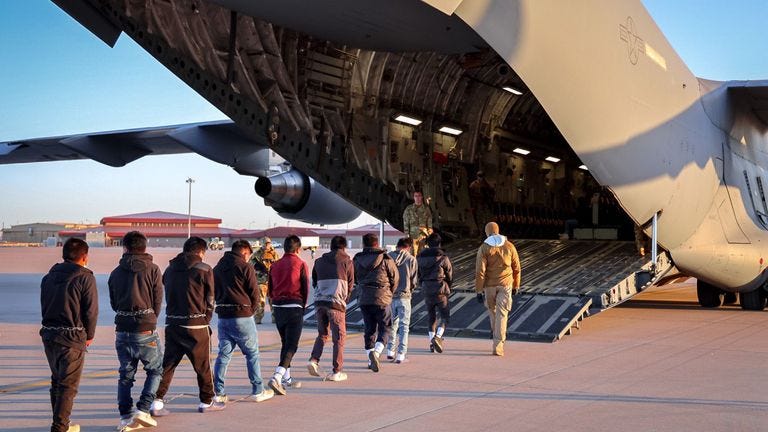What Do DeepSeek AI, Colombia, and the World Health Org. Have in Common?
They are all examples of the United States being humiliated on the world stage by a burgeoning Global South.

Just one day after Trump’s inauguration, he was joined at the White House by cloud computing mogul Larry Ellison and AI evangelist Sam Altman, yet another stark reminder of just how much of a page turn tech figures like Altman, who once called Trump "an unprecedented threat" to “the future of the republic”, were making to curry favor with him. There, the trio made public the existence of the Stargate Project, a sort of joint venture AI moonshot program intended to accelerate the development of domestic AI projects to the tune of $500 billion. Though the venture is being headed by Oracle and OpenAI (the companies belonging to Ellison and Altman, respectively), the project is primarily being bankrolled by a Japanese venture firm with Saudi ties known as SoftBank and a UAE venture firm called MGX. Trump cited competition with (you guessed it) China as a key motivator for the initiative, stating in his usual word salad speaking patterns, “China is a competitor, and others are competitors. We want it to be in this country, and we're making it available. I'm going to help a lot through emergency declarations, because we have an emergency. We have to get this stuff built.”
In almost poetic fashion, an AI-chatbot app from China by a previously unknown company called DeepSeek surged to the top of the iOS App Store mere days after the Stargate announcement. Predicated on the company’s eponymous and open-source DeepSeek R1 Model, the app and model have been praised, most notably for benchmarking and performing comparably to leading closed-source American models like OpenAI’s GPT-4o while costing 6% as much to develop ($6 million for R1 versus $100 million for 4o). Perhaps most notably, DeepSeek’s company doesn’t have the same access to chips as domestic American companies do. Export controls signed into law by Biden in 2022 make it difficult for Chinese companies to obtain the sort of bleeding-edge hardware from companies like Nvidia deemed integral by both the market and firms like OpenAI. Figures like Altman have fueled a meteoric rise in funding, staking grandiose claims about imminent AGI (artificial general intelligence) (an amorphous goalpost that seems to be shifting constantly) and dramatic shifts in the social contract once the robots come to take our jobs next year or so, even though there was already some evidence that the current approach to training generative AI is beginning to plateau. The revelation that all of this AI bluster might be a paper tiger, and that our current models may be achievable with a fraction of the hardware and available finances, sowed panic amongst investors, briefly wiping away a trillion dollars from the American tech stock market before recovering somewhat the next day. The specific details of the Stargate Project remain to be seen, but I am doubtful that the project will be as resourceful as its Chinese counterparts, and this story brings to mind the Foxconn Wisconsin publicity stunt from Trump’s first term.
What’s worse, AI is not the only realm where we are being upstaged by China. Electric vehicle sales account for half of new car sales in the country, a far cry from the United States’ paltry 7 percent or so. Companies both veteran and young alike are producing incredible and affordable vehicles, like Xiaomi’s SU7, a car with a design to rival the Porsche Taycan and specs on par with the Tesla Model 3 from a company that only made smartphones and gadgets until last year for around $30,000 USD. It launched to critical acclaim, even from Americans who were able to get in the driver’s seat. And it’s just one of many examples of high quality output in the country, such as exclusive cars from the likes of Hyundai and Mazda and exciting new vehicles from companies like BYD and NIO.
More relevant than all of those technological gains is the fact that Trump is making good on his promises to exit the United States from various multinational organizations and agreements, like the World Health Organization (WHO) and the Paris Climate Agreement. Unlike militaristic entities such as NATO, participation in these particular organizations from the world’s wealthiest nation helps fight epidemics and slow climate change’s advance. But China, one of the fastest growing economies in the world, is willing to step into the vacuum left behind by the United States, pledging their continued support to these organizations. Even Trump seems to be seeing his own blunder materializing in realtime and is now floating the idea of reversing our withdrawal.
But if the United States is fomenting a technological cold war of sorts with China, it is simultaneously pushing the rest of the developing world into its arms, some of which are right down the proverbial street. Take, for instance, the fiasco which took place last weekend between Gustavo Petro, the left-wing president of Colombia, and Trump over deportation flights. Petro took issue with the fact that migrants were being led in shackles onto military planes to be flown back to their countries of origin, calling it an insult to their dignity and humanity (never mind the superfluous cost imposed on the American consumer for what is effectively a theatrical stunt) and refused to allow these planes to land. Similar incidents occurred in Mexico and Brazil, but Petro was particularly public in airing out his misgivings. In response, Trump began the process of implementing exceedingly punitive 25% tariffs on goods imported from our neighbor and ally down south, which would have untold impact on goods we import frequently from them like crude oil and coffee for American consumers. Ultimately, Trump and Petro came to an agreement. The White House and even many in the media were quick to try and frame this as a win for Trump, but Petro ultimately got what he wanted. Future repatriation flights into the country will now be carried out via commercial planes, and migrants will not be shackled.
As China brings more of the developing world into its embrace by taking on greater responsibility in both Western-led organizations like the WHO and new and burgeoning alliances like BRICS, many in our own domestic political sphere are flailing aimlessly in response, even salivating over the prospect of a cold or even full-on hot war with China. But should the United States seek to maintain its global primacy, it should do so on two fronts: domestically, by nurturing and empowering a neglected populace long beset by aging infrastructure and prohibitively expensive housing, education, and healthcare, and by embracing economic pragmatism, nixing a decades-long dogmatic policy of suppressing relationships with and the growth of any state deemed incompatible with neoliberal capitalism, often through violence or the threat thereof. These countries are not interested in surrendering themselves to be exploited by unfettered American corporations or be subject to debt-trap diplomacy carried out by western vassals like the IMF. But should Trump continue to pursue a policy of bullying our allies in the developing world into adopting his pet projects, he will drive them further into a united front against us, while things continue to deteriorate at home. In the words of a translated tweet reposted by Petro:
Trump has just confronted Mexico, Colombia and Brazil. Are we the people of the South really the ones who should be worried? I think it's the other way around.



